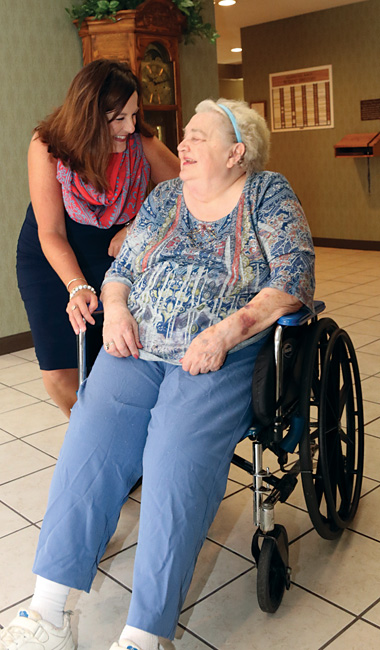It may be hard to find good help these days, but the residents and staff at Aviston Countryside Manor work hard together to make “care” the important word in nursing home care.
Leslie Pedtke creates and innovates in her role as administrator of the home, working with and among residents to create an atmosphere of respect and inclusiveness. The home isn’t a drop-off point for elder relatives but a place where people can find a second home. If this sounds like pie in the sky, then pull up a chair for a slice of life at the home.
A recent check of activity showed Pedtke and staff preparing to welcome poet, Gary Glazner, to present a workshop at their Memory Arts Café on reaching out to people with Alzheimer’s.
Youth from Mater Dei Catholic High School will participate in the workshop, learning a method of talking with residents in the language of words and poetry instead of the “word salad” some people with Alzheimer’s use.
Pedtke said Mater Dei students often volunteer at the home during the year, and she wanted to include them in learning this way of speaking.
The home is no stranger to creative ways of linking staff and residents. In fact, when Pedtke presented a unique program of sensitizing staff to the needs of nursing home residents at a national conference, Glazner heard about it and wanted to participate.
Called “Through the Looking Glass,” it invites employees to move into the nursing home for a period of time, perhaps up to a week or more, to live as residents live.
Pedtke brings a container to the employee who selects a note that describes a circumstance of living the employee must deal with for that day.
It might include inability to dress himself or herself, lack of mobility, need for assistance to use the bathroom or some other issue residents face each day.
By “living” with these challenges, staff understand better what it means to be a nursing home resident.
Glazner heard about the program in 2012 at a national conference — National Pioneer Network Conference — and asked if he could participate. In 2013 he arrived in Aviston to stay for a week.
He is founder and project director of the Alzheimer’s Poetry Project and has published a book in 2014: “Dementia Arts: Celebrating Creativity in Elder Care.”
Glazner discovered the unique way people with Alzheimer’s or dementia can be engaged with poetry. He was, he said in his book, and remains “inspired to make my life’s work serving people who are living with dementia … .”
Described as a “call and response” method of reaching out to people with memory loss, Glazner recites lines of familiar poems and people answer him with words or lines of the poem.
While Glazner will be the first to headline the Memory Arts Café, Pedtke said this will be the first of a series of free art events for all people.
Pedtke continues to look for ways to build relationships between staff and residents. She discovered as an administrator, staff members were treating symptoms instead of people. When staff entered into relationships with residents, the dynamic changed.
Residents regained their dignity and staff became much more sensitive to their needs, treating them more like the people they are.
For people with Alzheimer’s and dementia, the need to be relational is more difficult, especially when language is not easy or even evident.
Pedtke said this “creative engagement” is somewhat new in her field, but she wants to remind residents and their caregivers “they’re still part of the community; there’s still someone there; they’re still someone’s mom or dad.”
Pedtke has also introduced the use of iPods with some of the residents. “Think what it would be like if you would never hear your favorite song again,” she said.
With an idea to reduce or decrease the use of anti-psychotic drugs among residents, she put their favorite songs on about 20 iPods. It might be Christmas music, country, pop, jazz — whatever their favorite music.
When a resident might become agitated or uncooperative, instead of prescribing a drug, staff asks if the person would like to hear some music. “In the long run, it’s worth it,” to make the effort to try something different.
Other changes include lengthening the hours residents can access breakfast. Instead of having shifts with residents assigned a specific time for breakfast, the breakfast hours now run from 6:30 a.m. until noon because not everybody wants to eat breakfast before 8 a.m.
Pedtke wants the home to be a home for residents and staff, to interact, to continue to engage.
When someone applies to work at Aviston Manor, that is just the first tep in a process to see if that person is a good fit for Aviston Countryside Manor.
A committee of residents interviews the prospective staffer along with Pedtke. “If just one resident says ‘no,’ that person is not hired,” she said.
The next step would be an opportunity to see how the residents live. Every prospective staff member must spend 24 hours living at the home, to see what it’s like.
Pedtke believes in the people she serves being able to be served by a caring and compassionate staff.
“This is a person centered model” of long-term care,” Pedtke said. “I’m passionate about the people here and for the people (who serve them) to learn to serve them better.”
For more information about Aviston Countryside Manor, please see avistoncountrysidemanor.com






